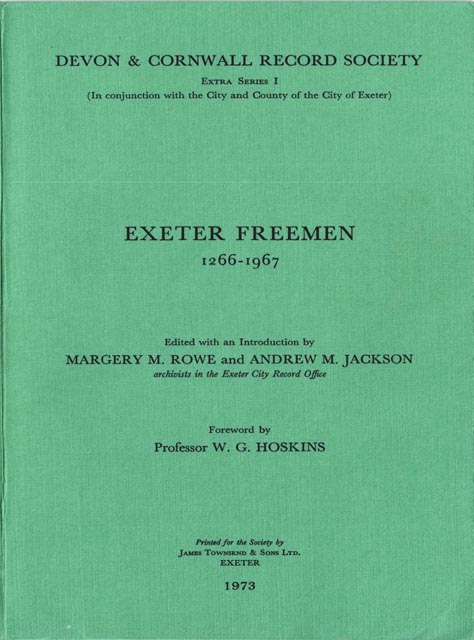Foreword
Published online by Cambridge University Press: 05 August 2023
Summary
The records of the city of Exeter are probably the finest collection of their kind outside London. Even the voluminous Report published by the Historical Manuscripts Commission in 1916 reveals only part of the remarkable richness and range of the muniments now cared for in the City Record Office. Yet despite this richness, or more likely because of it, very little indeed has been published, though the records have been used by many decades of scholars in their manuscript state.
This volume of Exeter Freemen 1266-1967 is the first large-scale attempt at publication as a joint enterprise between the Devon and Cornwall Record Society and the Exeter City Council; and it is to be hoped that it will be the start of a developing series. Not that the lists of the freemen constitute a single massive record: the twelve thousand or so names have had to be laboriously culled from a number of different records, as is sufficiently indicated in the scholarly Introduction by Mrs Margery Rowe, the senior archivist, and her assistant Mr Andrew Jackson. It is probably true to say that the back of this great task had been broken by Mr R. A. McKinley, a former archivist of the city; but he would be the first to admit that much more research and excavation had to be done before a definitive list, as distinct from a hand-list for office use, could be published.
This is an important volume, not only because it covers seven hundred years of municipal history, but also because Exeter ranked as one of the leading cities of the kingdom for the best part of a thousand years. Certainly this was so from the nth century to the 18th, a period in which we can make the necessary comparisons with other towns. At the time of Domesday, Exeter was probably eighth largest among provincial towns. The Danegeld aids under Henry I put the city fifth, after Winchester, Lincoln, York, and Norwich; and the aids in Henry IPs time rank Exeter as sixth in the provinces. William of Malmesbury, writing about the year 1125, speaks of the greatness of the city, the wealth of the citizens, the concourse of strangers, and the throng of foreign merchants whose ships could then reach the quay on the river.
- Type
- Chapter
- Information
- Exeter Freemen 1266-1967 , pp. vii - xPublisher: Boydell & BrewerFirst published in: 2023

